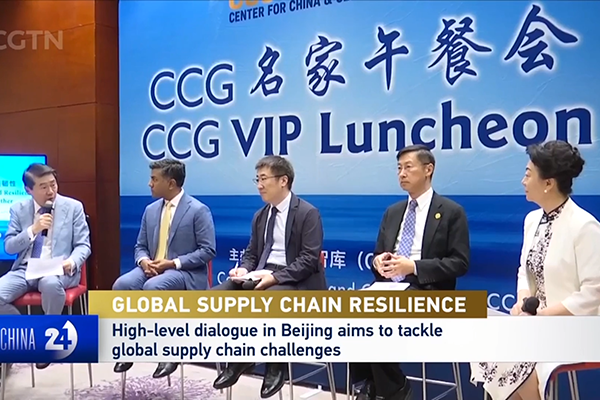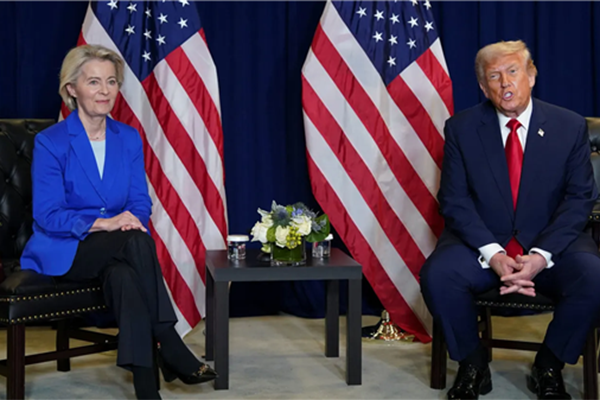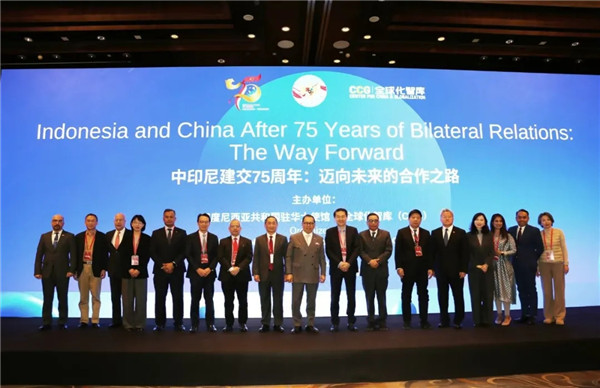【China Daily】China enters ’new era’
October 22 , 2017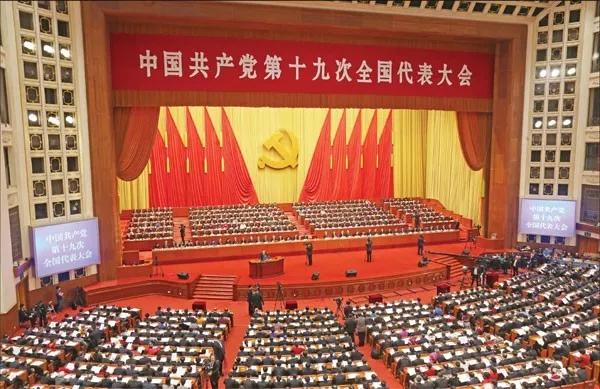
The Communist Party of China opens the 19th CPC National Congress at the Great Hall of the People in Beijing on Oct 18. Edmond Tang / China Daily
Xi outlines two-stage development plan in report, saying nation will continue its progress and become ’a great modern socialist country’ by midcentury
Xi Jinping, general secretary of the CPC Central Committee, said China has entered a “new era” as he set out his vision for the country at the opening of the nation’s biggest political meeting in five years.
Xi delivered the report to the 19th National Congress of the Communist Party of China in the Great Hall of the People in Beijing on Oct 18.
“(The meeting is) taking place during the decisive stage in building a moderately prosperous society in all respects, and a critical moment as socialism with Chinese characteristics has entered a new era,” he said.
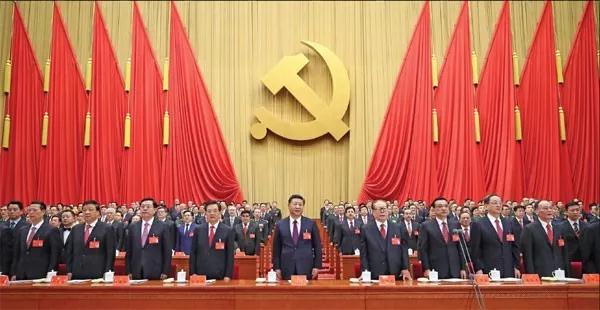
General Secretary Xi Jinping and former and incumbent leaders of the Communist Party of China participate in the opening session of the 19th CPC National Congress in Beijing on Oct 18. Lan Hongguang / Xinhua
In his delivery of the report, which lasted 3 hours and 23 minutes, Xi set out a two-stage development plan for the country that will take it to the middle of the century.
He said this involves moving on from being a “moderately prosperous society” by 2020 (achieved by doubling of the 2010 GDP per capita income) to achieving “socialist modernization” by 2035 and then becoming “a great modern socialist country” by the time of the 100th anniversary of the founding of the People’s Republic of China in 2049.
“This is our strategic vision… in the new era. Finish building a moderately prosperous society in all respects, proceed to basically realize modernization, and then move on to turn China into a great modern socialist country in every dimension,” he said.
“We must work with resolve and tenacity and write a brilliant chapter on our new journey to socialist modernization.”
The 2035 staging post requires China to have become a global leader in innovation and to have more equal rights for citizens and see improvements in the rule of law; an increase in China’s soft power; improved living standards and more equal access to basic public services; a more harmonious society with better social governance; and fundamental improvement in the environment with the goal of creating what Xi called a “beautiful China”.
By the middle of the century, the aim is for the modernization of China’s system to be complete. The country will be a global leader in terms of national strength and international influence. There will also be common prosperity for everyone, and Chinese people will enjoy happier, safer and healthier lives.
“(We must) strive for the great success of socialism… and work tirelessly to realize the Chinese Dream of national rejuvenation,” he said.
In the report, which was heard by 2,338 Party delegates and specially invited delegates in the hall, as well as media representatives from China and across the world, Xi had no doubt about the challenges ahead.
“As the Chinese saying goes, the last leg of the journey just marks the halfway point. Achieving national rejuvenation will be no walk in the park; it will take more than drum beating and gong clanging to get there. Every one of us in the Party must be prepared to work even harder toward this goal.”
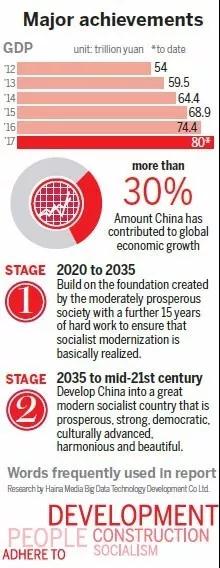
On the economy, Xi said that with China’s GDP growing by 43 percent from 54 trillion yuan ($8.15 trillion; 6.9 trillion euros, £6.17 trillion) to 80 trillion yuan over the past five years, it had contributed 30 percent of global economic growth during this time. The third-quarter GDP data published a day after the report given by Xi showed continued growth momentum, with the economy growing by 6.8 percent, although down slightly from the 6.9 percent achieved in the first and second quarters.
In his report, Xi emphasized the need for further supply-side reform and the importance of developing advanced manufacturing, artificial intelligence, big data and the science base of the economy.
He also stressed revitalizing China’s rural areas, some of which have been left impoverished by urbanization, by developing agriculture and encouraging more businesses to start up in these areas.
“Issues relating to agriculture, rural areas and rural people are fundamental to China, as they directly concern our country’s stability and our people’s well-being,” he said.
“Addressing these issues should have a central place on the work agenda of the Party, and we must prioritize the development of agriculture and rural areas.”
One aspect that is likely to be of major interest to companies wanting to invest in China was his commitment to making the country’s economy more open, which he said went hand in hand with the country’s Belt and Road Initiative.
“Openness brings progress, while self-seclusion leaves one behind. China will not close its door to the world; we will only become more and more open,” he said.
“We should pursue the Belt and Road Initiative as a priority, giving equal emphasis to ’bringing in’ and ’going global’,” he said.
Xi also said there would be no letup in the fight against corruption, one of the flagship missions since he was elected general secretary of the Party in 2012.
The Central Commission for Discipline Inspection, under its secretary, Wang Qishan, has seen many high-profile officials punished, including former Chongqing Party chief Sun Zhengcai, who was expelled from the Party on Sept 29; and former Politiburo Standing Committee member Zhou Yongkang, who was expelled from the Party and then sentenced to life imprisonment in 2015.
“The people resent corruption most; and corruption is the greatest threat our Party faces. We must have the resolve and tenacity to persevere in the never-ending fight against corruption,” he said.
Xi also made reference to achievements on the diplomatic front during the past five years.
This has included not just the Belt and Road Initiative and the creation of the Asian Infrastructure Investment Bank, but also the hosting of the 22nd APEC Economic Leaders’ meeting in Beijing in 2014, the G20 2016 Summit in Hangzhou, Zhejiang province, and the BRICS Summit in Xiamen, Fujian province, in September.
“China champions the development of a community with a shared future for mankind, and has encouraged the evolution of the global governance system. With this, we have seen a further rise in China’s international influence, ability to inspire, and power to shape; and China has made great new contributions to global peace and development.”
Peter Frankopan, professor of global history at Oxford University, says Xi is someone who presents a unified vision.
“When you are in Beijing, the old world represented by the United States and Britain, in particular, looks highly divided. There are conflicting views of what the direction of travel should be,” he says.
“What Xi has been very careful to do over the last few years is set out a grand vision, and now it is all about getting behind that vision and putting the shoulder to the grindstone to make sure it is deliverable.”
Wang Huiyao, president of the Center for China and Globalization, China’s leading independent think tank, says Xi’s report was one of the first he could remember by a Chinese leader that talked about mankind as a whole and not just about China.
He points out that in the report, the president said the “dream of the Chinese people is closely connected with the dreams of the peoples of other countries”.
“I believe it is the first time a leader in his report has talked about a common destiny of mankind. In the past, the main focus has been on the Party itself,” he said.
“It clearly demonstrates the global vision the president has with concerns relating to the environment and the Paris accord and across a whole range of issues.”
Rana Mitter, director of the Oxford University China Centre and one of the leading China historians in the West, says Xi was putting China front and center in world affairs.
“The major shift for me in the report is the statement of China being at the center of world affairs,” he says.
“With this more central role will come a lot more responsibilities in areas of international trade, the need to open up markets, and leadership positions on climate change and questions of local and global security.” On the economy, a number of commentators have noted that Xi has moved away from setting specific targets for GDP or any other measure for either 2035 or 2050, leaving greater room for other priorities to be achieved.
Zhu Ning, Oceanwide professor of finance at Tsinghua University, says this was the right way forward for economic policy management.
“The targets are less specific and less numbers-driven, which is also a good thing as well. They set out a new vision for development, which will probably mean the goals will be more sustainable,” he says.
Zhu, also author of China’s Guaranteed Bubble, which examines how the government plays a strong role in supporting the financial system, says what was striking from the speech was the long-term vision setting a course for China to 2050.
“It was probably the most forward-looking speech of its kind in recent memory. It was far-sighted not only in economic-related areas but in many others as well. It takes us up to the middle of the century and introduces this new target of 2035 also, ” he says.
Louis Kuijs, Hong Kong-based head of Asia for Oxford Economics, says that while Western politicians are constrained by electoral cycles and other factors, being able to set out a long-term plan has many advantages.
“It puts policymaking on a longer-term track. It helps persuade people to accept shorter-term pain for longer-term gains, and I personally think it is good to have a longer-term horizon,” he says.
“China is unique in this. Politicians in other systems find it hard to take this approach because there are always changes of leadership and changes of parties.”
Yukon Huang, senior fellow of the Asia program of the Carnegie Endowment for International Peace, the global think tank, says the scale of reforms that Xi is contemplating cannot be done overnight.
“He is trying to set out a much more long-term vision as to where China is going, and he makes clear that vision cannot be achieved in a couple of years,” he says.
“His reform agenda is not just about economic policy but much broader, covering politics, society as a whole, legal reform and China’s role in the world.”
Stephen Roach, senior fellow of the Jackson Institute at Yale University, believes Xi is right to place emphasis on tackling corruption.
“Now the Chinese government is making a determined effort to address this issue; I think it is reasonable to say that this is a step in the direction we have been asking for for a long time.”
Frankopan, also author of the bestselling The Silk Roads: A New History of the World, says one aspect of Xi that impresses him is that he never underestimates the challenges ahead.
The president emphasized this again in his report by saying that his aims for the country would not be a “walk in the park”.
“What is striking about Xi is that when he gives speeches, he doesn’t make it sound like it is all easy. He is quite candid in explaining what the issues and the problems are. This is what you want to hear rather than the dress rehearsal where everything is all perfect.”
Wang Huiyao of the Center for China and Globalization (CCG), who is also a counselor to the State Council, says Xi is now perhaps the only world leader who is prepared to stake out a global leadership position.
“We saw it with his Davos speech in January defending globalization, and we see it again with his speech to the congress,” he says.
“His vision means this is no longer just a congress for the CPC, but one that has global ramifications and that is now backed by initiatives such as the Belt and Road Initiative, the Asian Infrastructure Investment Bank and other major China-led initiatives.”
